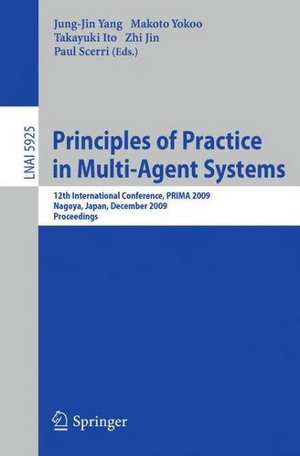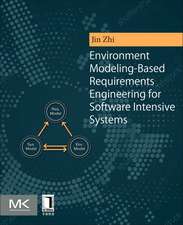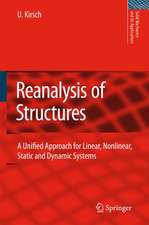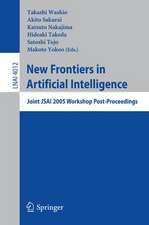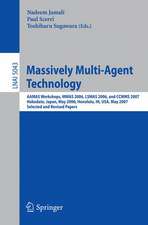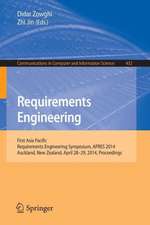Principles of Practice in Multi-Agent Systems: 12th International Conference, PRIMA 2009, Nagoya, Japan, December 14-16, 2009, Proceedings: Lecture Notes in Computer Science, cartea 5925
Editat de Jung-Jin Yang, Makoto Yokoo, Takayuki Ito, Zhi Jin, Paul Scerrien Limba Engleză Paperback – 11 dec 2009
Din seria Lecture Notes in Computer Science
- 20%
 Preț: 1061.55 lei
Preț: 1061.55 lei - 20%
 Preț: 307.71 lei
Preț: 307.71 lei - 20%
 Preț: 438.69 lei
Preț: 438.69 lei - 20%
 Preț: 645.28 lei
Preț: 645.28 lei -
 Preț: 410.88 lei
Preț: 410.88 lei - 15%
 Preț: 580.46 lei
Preț: 580.46 lei - 17%
 Preț: 427.22 lei
Preț: 427.22 lei - 20%
 Preț: 596.46 lei
Preț: 596.46 lei -
 Preț: 449.57 lei
Preț: 449.57 lei - 20%
 Preț: 353.50 lei
Preț: 353.50 lei - 20%
 Preț: 1414.79 lei
Preț: 1414.79 lei - 20%
 Preț: 309.90 lei
Preț: 309.90 lei - 20%
 Preț: 583.40 lei
Preț: 583.40 lei - 20%
 Preț: 1075.26 lei
Preț: 1075.26 lei - 20%
 Preț: 310.26 lei
Preț: 310.26 lei - 20%
 Preț: 655.02 lei
Preț: 655.02 lei - 20%
 Preț: 580.93 lei
Preț: 580.93 lei - 20%
 Preț: 340.32 lei
Preț: 340.32 lei - 18%
 Preț: 938.83 lei
Preț: 938.83 lei - 20%
 Preț: 591.51 lei
Preț: 591.51 lei - 15%
 Preț: 438.59 lei
Preț: 438.59 lei - 20%
 Preț: 337.00 lei
Preț: 337.00 lei -
 Preț: 389.48 lei
Preț: 389.48 lei - 20%
 Preț: 607.39 lei
Preț: 607.39 lei - 20%
 Preț: 1024.44 lei
Preț: 1024.44 lei - 20%
 Preț: 579.30 lei
Preț: 579.30 lei - 20%
 Preț: 763.23 lei
Preț: 763.23 lei - 20%
 Preț: 453.32 lei
Preț: 453.32 lei - 20%
 Preț: 575.48 lei
Preț: 575.48 lei - 20%
 Preț: 585.88 lei
Preț: 585.88 lei - 20%
 Preț: 825.93 lei
Preț: 825.93 lei - 20%
 Preț: 763.23 lei
Preț: 763.23 lei - 17%
 Preț: 360.19 lei
Preț: 360.19 lei - 20%
 Preț: 1183.14 lei
Preț: 1183.14 lei - 20%
 Preț: 340.32 lei
Preț: 340.32 lei - 20%
 Preț: 504.57 lei
Preț: 504.57 lei - 20%
 Preț: 369.12 lei
Preț: 369.12 lei - 20%
 Preț: 583.40 lei
Preț: 583.40 lei - 20%
 Preț: 343.62 lei
Preț: 343.62 lei - 20%
 Preț: 350.21 lei
Preț: 350.21 lei - 20%
 Preț: 764.89 lei
Preț: 764.89 lei - 20%
 Preț: 583.40 lei
Preț: 583.40 lei - 20%
 Preț: 649.49 lei
Preț: 649.49 lei - 20%
 Preț: 341.95 lei
Preț: 341.95 lei - 20%
 Preț: 238.01 lei
Preț: 238.01 lei - 20%
 Preț: 538.29 lei
Preț: 538.29 lei
Preț: 664.95 lei
Preț vechi: 831.19 lei
-20% Nou
Puncte Express: 997
Preț estimativ în valută:
127.23€ • 132.85$ • 105.31£
127.23€ • 132.85$ • 105.31£
Carte tipărită la comandă
Livrare economică 04-18 aprilie
Preluare comenzi: 021 569.72.76
Specificații
ISBN-13: 9783642111600
ISBN-10: 3642111602
Pagini: 676
Ilustrații: XV, 658 p.
Dimensiuni: 155 x 235 x 35 mm
Greutate: 0.95 kg
Ediția:2009
Editura: Springer Berlin, Heidelberg
Colecția Springer
Seriile Lecture Notes in Computer Science, Lecture Notes in Artificial Intelligence
Locul publicării:Berlin, Heidelberg, Germany
ISBN-10: 3642111602
Pagini: 676
Ilustrații: XV, 658 p.
Dimensiuni: 155 x 235 x 35 mm
Greutate: 0.95 kg
Ediția:2009
Editura: Springer Berlin, Heidelberg
Colecția Springer
Seriile Lecture Notes in Computer Science, Lecture Notes in Artificial Intelligence
Locul publicării:Berlin, Heidelberg, Germany
Public țintă
ResearchCuprins
Technical Papers.- A Market-Based Multi-Issue Negotiation Model Considering Multiple Preferences in Dynamic E-Marketplaces.- Designing Protocols for Collaborative Translation.- An Affective Agent Playing Tic-Tac-Toe as Part of a Healing Environment.- A Multi-agent Model for Emotion Contagion Spirals Integrated within a Supporting Ambient Agent Model.- Statistical Utterance Selection Using Word Co-occurrence for a Dialogue Agent.- On the Impact of Witness-Based Collusion in Agent Societies.- Efficient Methods for Multi-agent Multi-issue Negotiation: Allocating Resources.- Token Based Resource Sharing in Heterogeneous Multi-agent Teams.- Gaia Agents Implementation through Models Transformation.- ONTOMO: Development of Ontology Building Service.- Syncretic Argumentation by Means of Lattice Homomorphism.- Adaptive Adjustment of Starting Price for Agents in Continuous Double Auctions.- SIM-MADARP: An Agent-Based Tool for Dial-a-Ride Simulation.- An Empirical Study of Agent Programs.- A Multiagent Model for Provider-Centered Trust in Composite Web Services.- Memory Complexity of Automated Trust Negotiation Strategies.- Layered Distributed Constraint Optimization Problem for Resource Allocation Problem in Distributed Sensor Networks.- NegoExplorer: A Region-Based Recursive Approach to Bilateral Multi-attribute Negotiation.- Applying User Feedback and Query Learning Methods to Multiple Communities.- An Adaptive Human-Aware Software Agent Supporting Attention-Demanding Tasks.- Designing a Two-Sided Matching Protocol under Asymmetric Information.- Emotion Detection from Body Motion of Human Form Robot Based on Laban Movement Analysis.- HoneySpam 2.0: Profiling Web Spambot Behaviour.- Multimedia Papers.- A Modeling Tool for Service-Oriented Open Multiagent Systems.- Analysis, Comparison and Selection of MAS Software Engineering Processes and Tools.- A Synchronous Model of Mental Rhythm Using Paralanguage for Communication Robots.- Generating Association-Based Motion through Human-Robot Interaction.- SmartContractor: A Distributed Task Assignment System Based on the Simple Contract Net Protocol.- Participatory Simulation Environment gumonji/Q: A Network Game Empowered by Agents.- Industrial Papers.- A Multi-Agent System Based Approach to Intelligent Process Automation Systems.- Non-equity Joints among Small and Medium Enterprises and Innovation Management: An Empirical Analysis Based on Simulation.- Wide-Area Traffic Simulation Based on Driving Behavior Model.- An Agent-Based Framework for Healthcare Support System.- Interpolation System of Traffic Condition by Estimation/Learning Agents.- Poster Papers.- A Fuzzy Rule-Based System for Ontology Mapping.- Where Are All the Agents? On the Gap between Theory and Practice of Agent-Based Referral Networks.- SADE: A Development Environment for Adaptive Multi-Agent Systems.- Recursive Adaptation of Stepsize Parameter for Non-stationary Environments.- Mechanism Design Simulation for Healthcare Reform in China.- Case Learning in CBR-Based Agent Systems for Ship Collision Avoidance.- An Adaptive Agent Model for Emotion Reading by Mirroring Body States and Hebbian Learning.- Agent Evacuation Simulation Using a Hybrid Network and Free Space Models.- Designing Agent Behaviour in Agent-Based Simulation through Participatory Method.- Influence of Social Networks on Recovering Large Scale Distributed Systems.- Dynamic Evolution of Role Taxonomies through Multidimensional Clustering in Multiagent Organizations.- Adaptation and Validation of an Agent Model of Functional State and Performance for Individuals.- A Cooperation Trading Method with Hybrid Traders.- GPGCloud: Model Sharing and Execution Environment Service for Simulation of International Politics and Economics.- Creating and Using Reputation-Based Agreements in Organisational Environments.- Directory Service in the Language Grid for System Integration.- SBDO: A New Robust Approach to Dynamic Distributed Constraint Optimisation.- Evacuation Planning Assist System with Network Model-Based Pedestrian Simulator.
